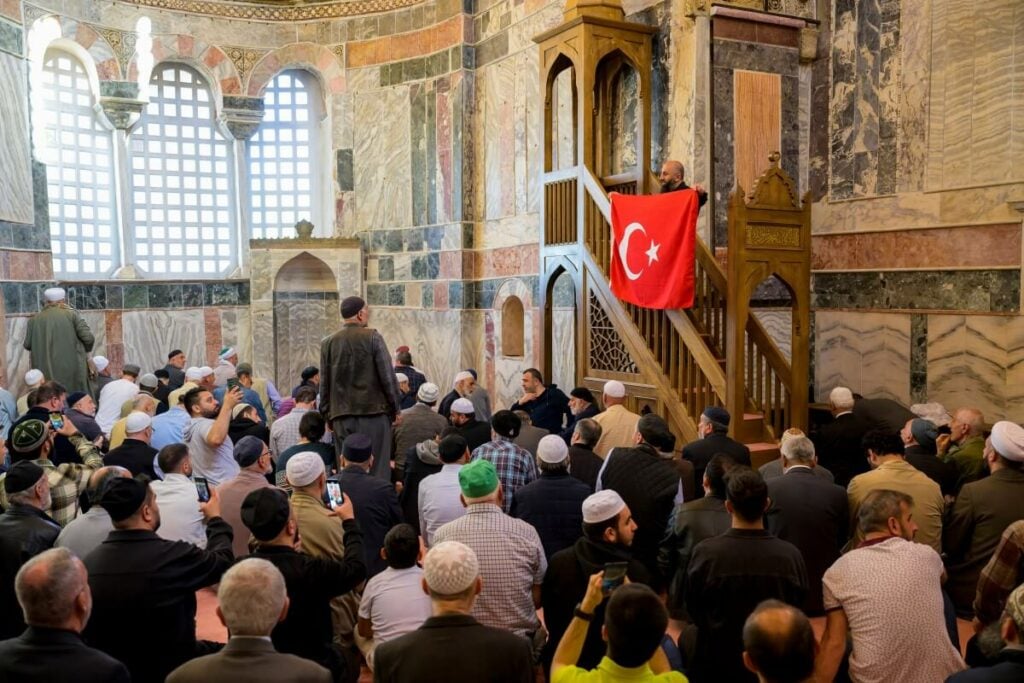The Greek government and the country’s main opposition party have condemned the reopening of an ancient Greek Orthodox church in İstanbul as a mosque earlier this week, calling the move an act of “provocation” distorting the character of the building.
Turkish President Recep Tayyip Erdoğan on Monday opened to worship a mosque converted from the ancient Chora Church, four years after he ordered its transformation.
In 2020 Erdoğan ordered that the building — a Byzantine church, then a mosque and then a museum — be converted into a Muslim place of worship one month after a similarly controversial ruling on the UNESCO-protected Hagia Sophia.
The Greek Foreign Ministry and the main opposition SYRIZA — the Coalition of the Radical Left–Progressive Alliance — condemned the development in separate statements.
“The Turkish authorities’ decision to begin the operation of the Monastery of Chora as a Muslim mosque constitutes a provocation for the international community as it distorts and affects its character as a UNESCO World Heritage Site belonging to humanity,” the Greek Foreign Ministry said in a statement on Monday.
The ministry said the maintenance of monument’s universal character and compliance with international standards for the protection of religious and cultural heritage is a clear international obligation binding on all states.
SYRIZA also expressed frustration with the move, unequivocally condemning it while also voicing its criticism about the “apologetic” reaction of the Greek foreign ministry, the Greek Kathimerini newspaper reported.
“The apologetic, condescending, substandard reaction/response of the Foreign Ministry to [Turkish President Recep Tayyip] Erdogan’s new challenge to turn the Monastery of Chora into a mosque, after Hagia Sophia, is revealing of the kind of foreign policy that the government is practicing towards Turkey,” the party said, while also calling on the Greek government to “take diplomatic actions against this new Turkish provocation.”
The Turkish government’s move to reopen the Chora Church as a mosque comes days before a visit Greek Prime Minister Kyriakos Mitsotakis will pay to Ankara on May 13, reciprocating a visit by Erdoğan to Athens in December.
Meanwhile, Mitsotakis, who met with Greek President Katerina Sakellaropoulou in Athens on Wednesday, said he would raise the issue during his meeting with Erdoğan and voice his “strong dissatisfaction, reflecting the sentiments of all Greeks, regarding the entirely unnecessary conversion of a historic temple, the Monastery of Chora, into a mosque,” according to Greek media.
He said he believed Turkey’s move undermines the rich history of “Constantinople,” currently known as İstanbul, itself as a crossroads of civilizations.
The Holy Saviour in Chora was a Byzantine church decorated with 14th-century frescoes of the Last Judgement that are still treasured by Christians.
The church was converted into the Kariye Mosque half a century after the 1453 conquest of Constantinople by the Ottoman Turks.
It was designated as a museum by the Turkish government in 1945.
A group of art historians from the United States helped restore the original church’s mosaics and they were put on public display in 1958.
Hagia Sophia — once the seat of Eastern Christianity — was also converted into a mosque by the Ottomans.
Atatürk, the founder of modern Turkey, after World War I turned the UNESCO World Heritage Site into a museum in a bid to promote religious neutrality.
Nearly 100 years later, Erdoğan, whose ruling Justice and Development Party (AKP) has Islamic roots, turned it back into a Muslim place of worship.

